Toronto Maple Leafs head coach Sheldon Keefe addressed the media after day two of Phase 3 training camp, discussing the task in front of Nick Robertson in order to make the team, the focus on special teams and improving the team’s defensive play, Ilya Mikheyev’s impressive form coming back from injury, and much more.
What specifically will you be looking for from Nick Robertson that will tell you he is ready to play?
Keefe: He needs to find a way to be effective in all areas of the game. Obviously, offense is a big part of his game. He has been very successful, particularly this past year, at proving himself to be an elite goal scorer at the junior level. Trying to find his way to getting the right timing to find space to get shots off and use his strengths offensively — there is that part of it.
As he has going to learn, if he hasn’t already here in the first few days, is that it is a lot harder to do those things at this level. You’ve got to be so much better in every area of the game. That is no different than any of our other players. There is just so much more urgency to other areas of the game that you maybe get away with in junior and can make up for with the extra opportunities you get to score. Those are few and far between. You have to take advantage of the ones you do get, but you have to be good in every area.
We’ve had these discussions with him in our talks throughout the pause in preparing for this. He knew it was going to be a challenge going in, and as you can see with how we are utilizing him through the camp, he needs to earn it and really show it and make it obvious that he is ready. He has some time to be able to do that.
Is some of that a physical challenge for someone his size going up against men?
Keefe: That is part of it, for sure. How can you handle it? There are going to be physical mismatches. It is a matter of how you can compensate for that by using your intelligence and work ethic and competitiveness that he has. He has a lot of those intangibles that are going to help him succeed for sure in the long run. Whether or not it can happen quickly to be able to impact this tournament we are preparing for — that is the question that needs to be seen.
We are happy to have him here to learn more about him and give him the opportunity, but we’ve got other guys here as well that are competing for those spots, not to mention those who were a part of our team. Others are here that were with the Marlies and played some time for us, or even if they haven’t, these guys are all committed to being here and working. Virtually all of them have been here — Brooks, Agostino, Petan — for five weeks. In fact, they came even earlier to get through their quarantines and be prepared for Phase 2. They’ve been putting in lots of work. We’ve got great competition for those spots.
What inspired the move to bring in an officiating crew to be on the ice with the guys today?
Keefe: With the officials, frankly, we wanted to have them be a part of the whole camp. They were going to be here yesterday, but they have to get tested and do all of the things. That delayed it a day to have them involved.
Any time we are doing any sort of scrimmaging, we would like to have the officials involved if we can. They were here today when we were doing special teams. We still think it adds a bit of a game element to it. The professionalism of the faceoffs, the way things are called, just having them on the ice and the fact that there are four more bodies out there — that in itself is different.
I think it is important. We are trying to get up to speed to game feel and intensity as quickly as possible. We’ve got to take advantage of every day that we have.
How much do you expect to focus on special teams during this camp?
Keefe: Special teams are a huge part of it. That’s why we got right to it today. It’s a huge part of any season, but in the playoffs, it can make or break you. We wanted to get right at it.
How did you settle on Matthews back with Nylander again? Did you spend a lot of time thinking about it during the pause?
Keefe: I didn’t spend a lot of time on it, frankly. That is how we finished. Just before the pause, we had made that switch. I felt strongly enough about it at that time. The main goal of having Mitch play with Auston when he did is just to see what that chemistry would be like with a bigger sample. We really liked what we saw from it. We had great success with it. Now we have confidence in that.
I think if I’ve shown anything, it’s that I won’t stick with anything too long if it isn’t working. I also think that Mitch is a good player no matter where we put him. He had great chemistry with John at the same time. We need to have two very good lines. We think Mikheyev will bring a lot to that.
That said, we’ve got two weeks here. I expect to move things around a little bit here and there just to try different things and get guys comfortable with each other. I expect it to move around a fair bit, but we like the fact that really within that top-six forward group, we’ve got lots of combinations that can work.
What went into the idea of having a scrimmage 5-on-4 for a half-hour or so?
Keefe: I have done it before. It has been a while since I ran a training camp. My last four training camps have been with the Marlies and we haven’t had any real camps. We just kind of get our players and away we go. Their camp has been with the Leafs. It has been a while, but I’ve always taken that sort of approach.
In this circumstance here, we’ve got to get our special teams going right away. We also need to get as many game reps as possible. I think the work that we’ve done in Phase 2 — having so many players here putting in the work that we have, and the feedback and input they’ve allowed the coaching staff to have in the work, even though it was a voluntary phase — we’ve really been able to push and get a lot of work done in that Phase. It has allowed us to be really ahead of where, in my opinion, we thought we might be at this stage.
We were able to try different things and do different things and have a great volume of work. Special teams were something we were able to move up, and we were happy to do so because it is very important.
What is your take on having a smaller, focused camp like this?
Keefe: I like it. In a perfect world, you would probably want it to be a little bit bigger so you could do a little bit more with the two practices we would like to have. At this point, we’ve elected to have two different groups and the numbers get a little bit light, particularly with defensemen. It makes it a little more challenging. Yesterday, of course, we were down a body on defense and it all of a sudden makes it pretty tough. Having some more guys around is pretty helpful.
I think you get a truer sense of what you have and the calibre of play is greater when the group is smaller. Of course, it makes a lot of sense at this stage given we don’t have a lot of time to get our team ready and prepared to play in a playoff environment. Having small numbers is good.
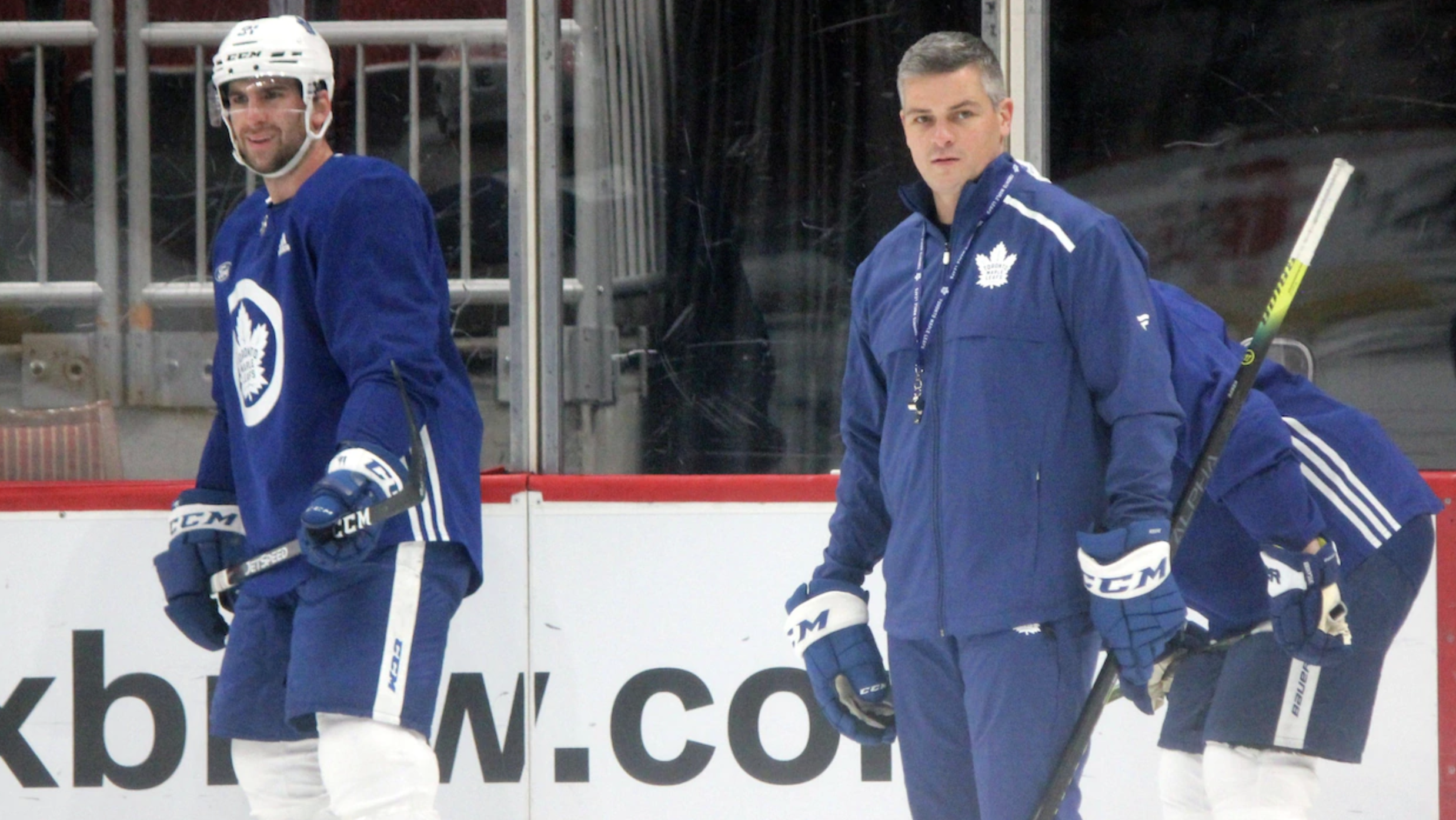
What is the biggest difference you’ve noticed about a camp like this in these circumstances?
Keefe: I’d say the biggest thing is that players are at really different stages of where they are at with their conditioning. That would probably be the greatest challenge. We got a lot of work done here in Phase 2. We had a lot of players in here. I am not sure what our numbers ended up being, but it was a lot of guys — something like 25 guys that were here for the better part of a month at least.
We also have a crew of guys who have had not anywhere near as much because of the different circumstances they had — quarantine, travel, whatever the case may have been.
That probably has been the biggest difference. That said, we are trying to not let that affect our decision-making. We’ve gotten so much work done in Phase 2 that we believe has really put us ahead of the game here in that sense with the conditioning and some of the things we were able to get done there. We can’t afford to bring the top down; the bottom has got to come up here. The guys who haven’t been able to skate as much will have to fight through it.
We’ll be intelligent about it, but those guys have got to really work and get themselves up to speed quickly because we don’t have the time to wait for it. We’ve just got to make them push through.
Coming in mid-season, how difficult was it at that time to really get your systems in place and your message across?
Keefe: It was very difficult in terms of wanting to do so many things. You have a plan to do so many different things — not just on the first day. On the first day, you target a couple of things you want to make in terms of adjustments, but you have greater plans beyond that. As the schedule really comes at you and you realize where the players’ energy levels really are, then you realize, “I really can’t do this or that. If I introduce this today, there is not going to really be the time to build upon it because we are full steam ahead.”
That would be the biggest challenge. That has been what is exciting about this — the time to really work at different things. Also, we had ample time to look at our game very honestly and make a plan to improve in areas we need to get better.
It has been an exciting process for us as a coaching staff. Our staff has done terrific work — Paul McFarland, Dave Hakstol have done really good work, supported by Andrew Brewer and Jordan Bean in their work for us over this pause. We’ve been really prepared. We are excited to get to work on the things we know we can do better.
Overall, are you happy with how the players have come back in terms of the work they’ve put in?
Keefe: I am certainly happy with how they’ve come back. As I’ve mentioned, a lot of that is through our work in Phase 2. Our guys are further along. Over my five years in the organization, I have taken in a lot of the summer skates that occur before training camp begins. I have watched a fair number of those. Phase 2 was much different — much greater focus level. The intensity of everything that they were doing, the conditioning work that they did — a lot of our hard conditioning was done prior to this.
John Tavares really took a lead, along with the rest of our leadership group, to really get work done in advance so we can really work on other things and get to work at game-like situations as quickly as possible. That is really what I have been most impressed with.
During the pause, you were taking an honest evaluation of where the team stands at this time. Can you share with us what you came away with?
Keefe: I don’t think it is any secret we need to be a lot better defensively. There is no area of our game defensively that we are satisfied with. We are not kidding ourselves here. There are a lot of areas that we need to look at. Frankly, it is every area.
All three zones — everything that we are doing there, we are either tweaking it and making changes structurally to how we were playing, or we are having more focus and intensity and commitment to the habits and details within it. We fully expect our guys to be better defensively when we come back here. We are going to need to be given what is at stake.
That is the biggest area of opportunity for us to grow as a team. That is our focus here.
The nature of Ilya Mikheyev’s injury being what it is — have you seen any evidence of his arm or wrist affecting his shot or the way he handles the puck?
Keefe: No, I have seen none of it. In fact, I think he is shooting better, which I don’t think is to do with the wrist necessarily but just the amount of time he has been able to work at his game from an individual skills standpoint. I know Denver Manderson worked a lot with him — one of our development consultants — and he was able to get lots of time with that.
Miky, first of all, loves to work. He loves to be at the rink and loves to be on the ice. He and Jake Muzzin might have taken a week or two off here or there, but for the most part through the four months, they have been on the ice all of the time. They haven’t really taken any time off.
He is really ahead of the game here. I think he has really added some pieces, and the shot is the big thing. He scored a goal yesterday in the scrimmage. In practice, the way the puck is coming off of his stick, particularly off of the pass, is impressive. I think that is an addition to his game that is going to serve him well.

What is the message to players like Nick Robertson, Kenny Agostino, and Adam Brooks? How much do you dangle the carrot of making the team versus stressing the role of the importance of the taxi squad player?
Keefe: The message to the team yesterday is that we’ve got competition for spots. To say that we were happy or satisfied with the way we were playing and where we were at as a team before the pause is just not the case. We are challenging our players to push each other. That is not just the players that were on our team, but it’s those who have come in from the Marlies.
I have been really impressed, first of all, with the commitment. I mentioned Robertson, Agostino, Brooks — these guys were all some of the first arrivals here. In each case, they had to do up to two weeks of quarantine just to get on the ice. These have come here and put in the work, so they’re here to challenge and compete and push everybody.
They’re pushing to earn spots that are available if others don’t pull their weight, or they are just pushing to make the group better through their work in practices. That is the biggest thing for us — the whole group has to get better with our practice habits. We have to push each other to get better in every area of the game, particularly on the defensive side of the puck, and that starts in practice.
Every rep that we have has to be as close to game-like as we can. The conditioning part of it creates some additional challenges because it’s really hard to do when you’re tired, but our hope is that, whether it’s the two-line or three-line effect in practice and the scrimmages, by the time we get rolling with four lines, it feels a lot easier. Our hope is that by the time we play the real games, it feels easier than anything we’ve gone through in this camp.
The goal was to make it difficult, and the work in Phase 2 has allowed us to really push the envelope there. That is the goal the rest of the way.
What do you think it will do for you guys to have the full six defensemen together when you haven’t really had that this season?
Keefe: Yeah, we are excited about it. It gives us lots of different options to try different things. It makes us deeper. We don’t have to be as concerned about matchups, or whatever the situation might be. We still like our depth and everyone who ends up outside our top six, there are players who have played significant minutes for us and helped us win games.
We’ve got confidence beyond the top six, so that is really good and healthy for us. It helps our group. When we talk about our team getting better defensively, it’s easy to focus on our defense, but our message here through camp is that it is not just on our defense. Our forwards have got to do more work. We’ve got to be a five-man unit with how we defend in each zone. A lot of that work falls on the forwards. We’re going to need to get a lot better.


![Jim Montgomery Post Game, Bruins 4 vs. Leafs 2: “[Marchand] still manages to get under people’s skin, yet he doesn’t cross the line” Jim Montgomery, Boston Bruins post game](https://mapleleafshotstove.com/wp-content/uploads/2024/04/jim-monty-pg-to-218x150.jpg)
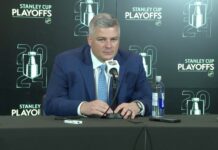

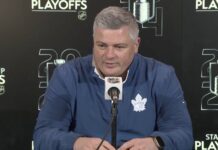




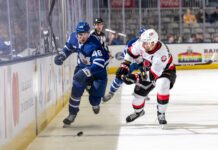














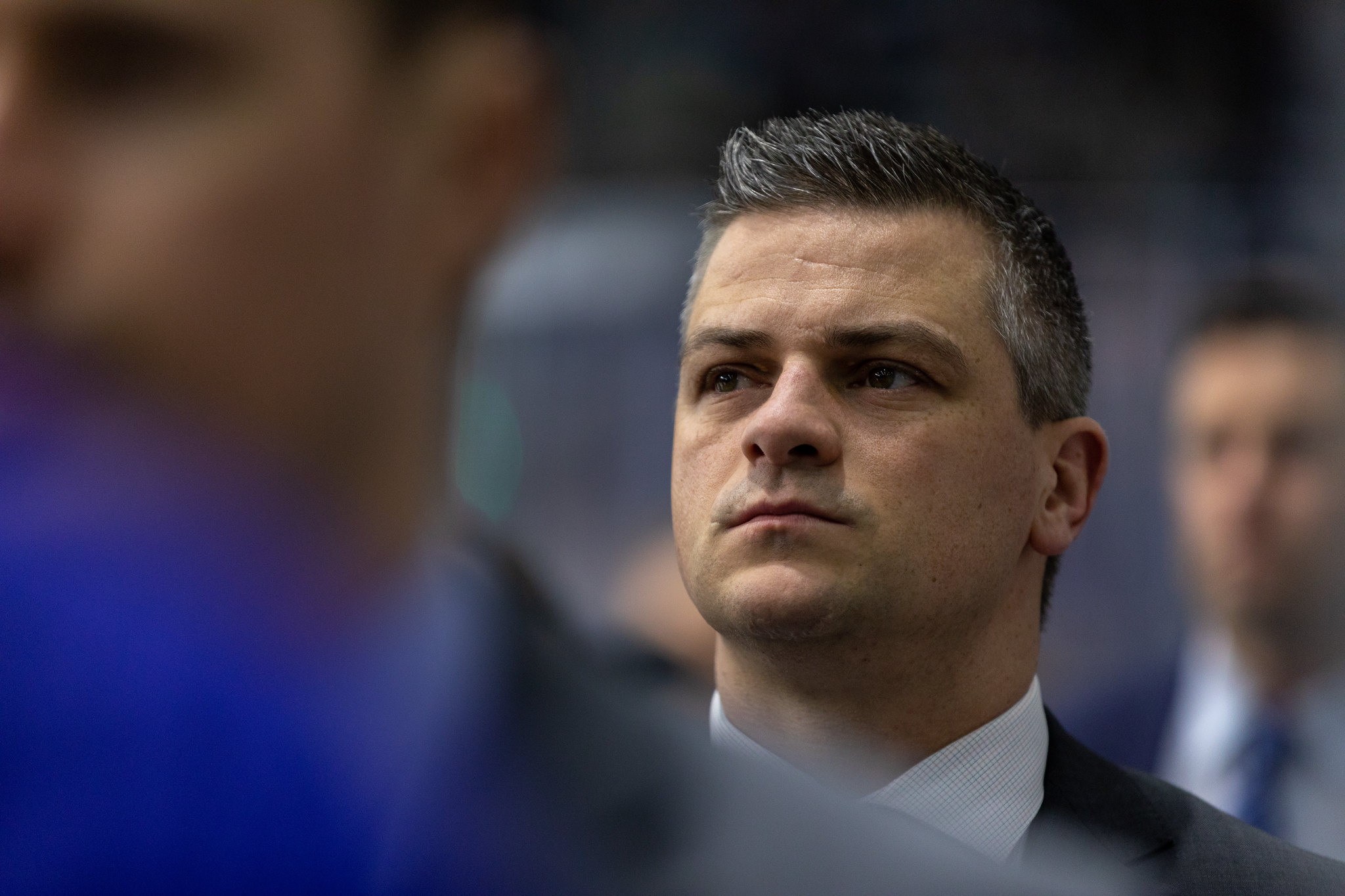

![Jim Montgomery Post Game, Bruins 4 vs. Leafs 2: “[Marchand] still manages to get under people’s skin, yet he doesn’t cross the line” Jim Montgomery, Boston Bruins post game](https://mapleleafshotstove.com/wp-content/uploads/2024/04/jim-monty-pg-to-100x70.jpg)







